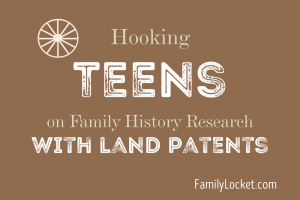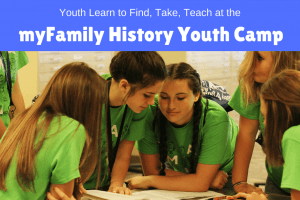
Today I’m interviewing my friend, Dafney Murray. She shares interesting insights into how her love for history has helped in her research, the benefits of sharing stories with her teenagers, and tips for researching enslaved ancestors.
Tell us about yourself.
Hi Nicole! I would describe myself as LDS for 25 years, an American of African descent, wife of 20 years, full time homemaker, mother of 2 teens and crazy about Family History!
How did you get started in family history? Do you remember an initial “spark” or incident that inspired you? Did you have any experiences as a child/teen in school or at home that helped you be more inclined toward family history?
As a child, there was a peculiar fascination with old black and white family photos. My grandmother would always allow me to look at the old photo albums and tell me stories about each photo. She told stories so well that my ancestors seemed alive! I had trouble at times differentiating between their life and death. They seemed so real. Of course, they were real people and had real lives.
What mentors influenced you to get started in family history and genealogy research?
My grandfather always told stories about how he’d visit the south every summer as a child and how he was related to the entire town he visited. Everyone was either a Murray or they were related to a Murray in some way. Wow! This story helped me find that town and many of my ancestors. The name of the town was Rafting Creek, Sumter, South Carolina. This was the heart of the beginning of the Civil War.
What personality traits, hobbies, or professional pursuits have helped you in your genealogy research?
Personally, I’ve always been a reader and history buff. Specifically, historical fiction is a favorite genre of mine. This goes hand in hand with genealogy research. I’ve been able to connect major events in American history to the challenges faced by my ancestors like slavery, the Civil War, Reconstruction Era, Flu Pandemic of 1918, Great Migration, etc.
For example, when finding many names for my paternal grandparents, I could not find very much information besides an initial census record. It seems as if many of them had just disappeared. Then, one day I located several death certificates, more than I care to count. Men, women and so many babies had died during the Flu Pandemic of 1918. This is sad, as well as, exceptional information for me for the following fact: flu shots do not and have never worked for me! I always get the flu every season and so do my children! We truly dread flu season because we suffer with ongoing illness. I’m guessing that my bloodline has never built up a strong immunity to the flu. However, my husband who is white and of Dutch descent does not suffer so greatly from the flu or flu shots. His ancestors survived the flu pandemic – so go figure.
Why do you do genealogy? Why do you think it’s important?
Genealogy has allowed me the opportunity to do missionary work. Each name provided me with a chance to have a spiritual experience when taking the names to the temple. There have been several spiritual experiences too. I’ve felt a deep closeness to them even though I’ve never met or seen most of them.

Just learning simple facts about the lives of my ancestors, their challenges and triumphs, has given me a deeper perspective concerning the true meaning of life: God and family. While slaves, my ancestors were able to live and work together. After slavery, those families were still intact. I have a deep belief that all families want to be together forever.
[For more about why Mormons do family history and temple work, read this.]
What is the most rewarding part of researching your family’s history?
Initially, I would say finding an unknown name and connecting (sealing) that name to their family. However, sharing family history stories with my children would be the most rewarding part of researching family history. It helps my children develop an identity of who they are in a grand sense. They can never feel insignificant knowing that they are a part of such a big family.
Through family history, my children will develop a certain confidence in knowing that they can achieve great things and conquer difficult challenges just like their ancestors. Their ancestors can help them learn how to deal with the challenges of this life. Through their stories, it’s almost as if their ancestors are cheering for them and saying, “If I can do these hard things, so can you!”
What has been the most difficult part of your genealogical journey?
As an American of African descent, it would have to be slavery. There is a wall you will soon it: the 1860 census. Slaves names are not listed on census records before 1860. So, there is a certain envy I have for others who have the opportunity to trace their ancestors almost seamlessly via census records.
Nevertheless, I would encourage all Americans of African descent to not be dismayed. Keep looking. I learned that not all of my ancestors were slaves! Some, especially the ancestors on the east coast states, were free. As a result, their records in the form of census, marriage and any church records available. It was like hitting the lottery! Also, wills, property and land records were valuable in helping me locate records of my ancestors who were slaves.
For example, I located a will that had both my ancestors listed as children on a plantation. They later created a family together, and I was able to estimate their births in 1815.
What are your research interests?
My research interests are the history of southern plantations. There is a wealth of information in that it may lead to information in wills and property. I’m so grateful for those who’ve submitted records of wills to ancestry.com. I’ve located lots of information about my ancestors there.
How do you preserve your family history?
Most of the information is preserved digitally because it never to be lost. However, each time there is a spiritual experience it’s recorded in my journal in the hope that my posterity (great grandchildren and beyond) will feel the special closeness to me that I already feel for them.
What is your favorite way to share genealogy and family history with others?
I enjoy sharing genealogy via photos. Photos are such a powerful way to touch others, and it’s a simple way to convey that while no longer in this life these are real people who had real lives.

Essex Taylor – one of my great-great-great grandfathers, father of the Taylor Clan, considered one of the most influential black men in South Carolina. It is believed he was a free man.
If you had all the time in the world to spend on family history, what would you do?
I would spend more time researching photos from local news clippings and calling potential relatives in the south. Maybe someone has a family history record of their own to share.
What’s the best discovery you’ve made about your family?
The best discovery I’ve made about my family is the number of men who were religious leaders in their community. Numerous men were preachers and reverends. This has made it a lot easier to connect the pieces of their lives and other relatives.
Who is your most interesting ancestor?
Nicole, it’s difficult to list one. I will say that what’s most interesting is the vast number of religious leaders I found in my family tree. There are numerous reverends, ministers and preachers listed on census records. This is interesting considering that my father and 2 brothers were also preachers of their own flocks too. I’ve learned that I come from a people who had faith, which makes temple work all the more meaningful and worthwhile.
Do you know someone who is passionate about family history and genealogy that we should interview for our next spotlight? Email and let us know! nicole@familylocket.com or diana@familylocket.com














Leave a Reply
Thanks for the note!